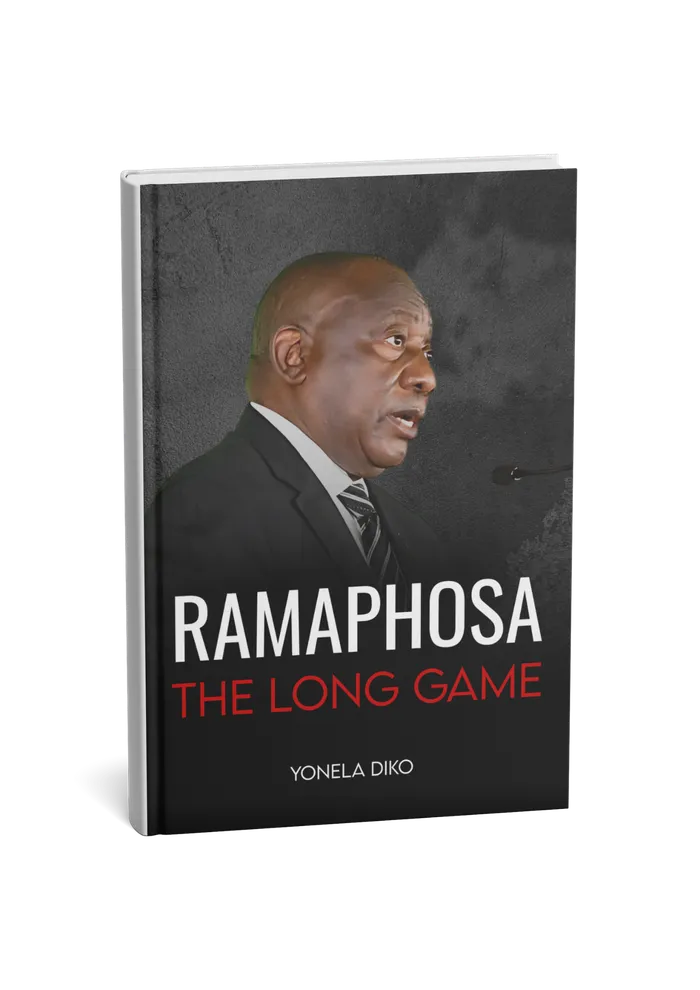
Long Game Book cover
Image: Yonela Diko
THE task for Cyril Ramaphosa, when he was elected President of the ANC in 2017 and subsequently President of the Republic in 2018 was clear: Revive the economy, eradicate corruption, rebuild state institutions and restore the credibility of the state. The question was how to get there.
This book makes the argument that given these sky-high expectations on the president, an expectation to unite a very divided ANC on one hand- because indeed a very divided ANC would not be able to discharge its party and government responsibilities- and on the other hand to urgently effect consequence
to some of the members of the very ANC, who had betrayed their oaths of office and committed sins against the people, a necessary act that had the potential to divide the very ANC the President was working to unite, Ramaphosa wisely decided to play the long game.
This book makes this point that in order to effect this difficult duality, goals that were effectively at odds with one another, the President chose to focus on rebuilding both ANC and State institutions so that it is the institutions themselves, and not the bully pulpit of the Presidency, that would make the achievement of this difficult duality possible.
The book makes another critical argument that Ramaphosa had picked up valuable lessons over the last 20 years of observing the fate of his predecessors, many of whom were very decisive, but ultimately alienated themselves from their own organisation and left the organisation prematurely and bitter. One of these lessons is that Institutions, and not individuals, must effect political consequences to avoid personality politics. When these institutions are strong and effective, no strong man can escape their reach.
While everyone expected the President to act like a bull in a china shop, and enter every department and fire every corruption accused individual, the President did not think this was a wise approach.
It was better to institute commissions of inquiries, at the NPA, at SARS, PIC and others and recalibrate ANC’s Integrity Commission and National Disciplinary Committee, so that people would face the jury of their peers, and for those in government, the public would be taken along, helping the President insulate himself from being seen as purging those aligned to different factions and further dividing the party.
Certainly, in the end, however long it took, all the President's detractors, who had seemed too powerful at the beginning of his tenure and threatening to cut his Presidency short, over time, fell under the might of renewed Institutions of the party and state, and all the President could do was to watch as his valiant work of rebuilding institutions paying great dividends.
There were also practical reasons why Ramaphosa was playing the long game and not taking rash decisions to satisfy the daily news cycles. The President was dealt a bad hand by the ANC conference in 2017, a small margin of victory that did not give him an outright mandate to make the sweeping changes he would have liked, paired with leaders who wanted nothing more than to see him fail and a bitter predecessor who was vengeful and wanted to lead from the grave.
Playing the long game however, particularly often choosing consensus over the bully pulpit of the Presidency created a perception that the President did not have the appetite for tough decisions, he takes too long to act, that he is weaker than his fierce opponents, who were willing to stop at nothing to see him serve only one term. It seemed at some point his detractors were more determined than him.
There are leaders however who remember Ramaphosa as a very decisive leader, ruthless even, leaders like Kuben Pillay, who had worked with Ramaphosa at NUM, and leaders like Cheryl Carolus, who was deputy to Ramaphosa when he was ANC Secretary General.
Looking at where some of Ramaphosa's nemesis at the beginning of his Presidency are today, some in political oblivious and forgotten, others political wanderers looking for a place to call home, and others on their last fray, where they must either swim or drown but they can no longer decide the fate of a President, one sees how playing the long game has been the best strategy for the President.
Playing the long game, however, can have devastating consequences in the short term, and the President was soon to find that out.
This book is about these long-term goals of the President and the short term setbacks he has had to endure. Whether it’s how the President dealt with his former Secretary General Ace Magashule, Busisiwe Mkhwebane, Arthur Fraser and Phala Phala, the Zuma arrest and Phoenix Massacre, Eskom and IPP’s and the world beyond our borders, this book presents a President who sets his sights on the end goals and in the end, I believe the President has finally freed the ANC of its heaviest albatross and its proxies, expressing itself in multiple factions and vulgarisation of ideologies.
The ANC is on its way to rebuilding back better.
This is extract of Diko's upcoming book, The Long Game. Diko is former ANC Western Cape spokesperson.